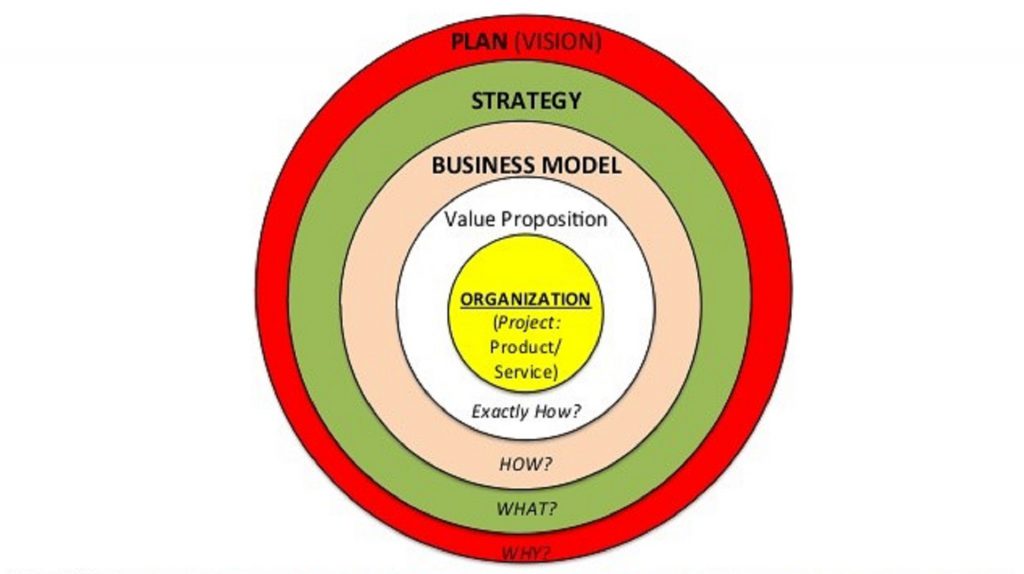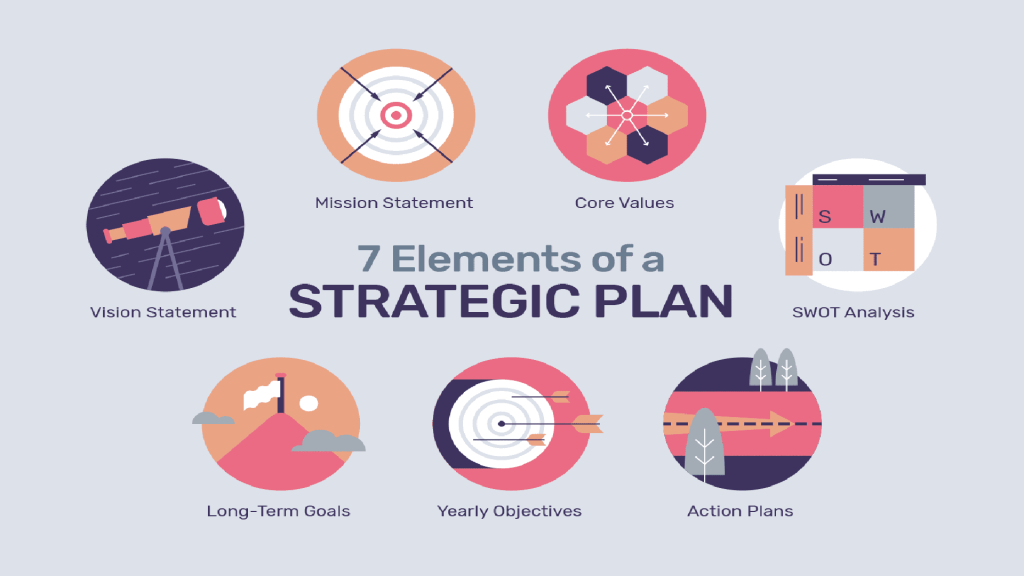Different businesses are formed with different goals, and as a result, they have to go through different paths to achieve their goals. This pathway is what creates the overall business strategy. Although the initial understanding of the concept of business strategy is simple, creating a business strategy tailored to the work conditions and with a high probability of success is not so simple. A business strategy can be considered as a combination of all the decisions made and actions taken by the business to achieve the ultimate goal and improve its position in the competitive market. Having a business strategy is just like having a road map to reach your goal. Any mistake in the road map can lead to the business getting off track and losing cost, capital, and time.
Table of Contents
Why should all businesses have a strategy?
A business that lacks a realistic strategy to achieve the goal is actually based on dreams and aspirations! This means that the entrepreneur will probably start moving by considering the final position of his company and hopes that things will proceed naturally without having a clear plan to reach that position.
In a non-competitive market, this management approach can more or less bring the entrepreneur closer to their goal, but in a competitive market that exists today in most countries of the world, such a thing is impossible. Now that the market is more competitive, the need to understand the importance of business strategy and its application is growing. In general, the necessity of business strategy can be summarized in a few cases:
Planning
Business strategy is part of the business plan. In business plan, the ultimate goals and objectives are determined, and in a business strategy, the path to those goals is determined.
Identify weaknesses and strengths
In most cases, businesses that are at the beginning of their path do not have good knowledge of their weaknesses and strengths. Planning to choose the right strategy to move can help you better understand your strengths and weaknesses.
Efficiency
When you plan for each stage of the business development, use all the resources and capacities, and let everyone know about what should be done, business efficiency will automatically increase.
Competitive advantage
One of the goals of a business strategy is branding rely on the strengths and competitive advantages of the business. Thus, a business strategy can be used to identify specific business characteristics and differentiate the business brand from similar competing companies from a customer perspective.
Control
Since the business strategy outlines all the steps needed to achieve the ultimate goal, it is possible to control and monitor more accurately the adaptation of actions and decisions in the right direction.
What is the difference between a business strategy, a business model and a business plan?
Although in some sources, these three are mistakenly used interchangeably, it should be noted that, as can be seen in the picture below, each of these business documents responds to different questions.

For example, in your business, after defining the product or service you want to offer, you have to define your proposed values and the competitive advantages of that product or service. After these two steps, you should consider the ways to convert that product or service to a cohesive business and you will develop your business model. In each of these steps, you can use different canvases such as innovation canvas, SWOT canvas, business model canvas, etc., and use the online tools which have been developed in Retiba.
After explaining well in your business model how you plan to launch your own business, you should clarify what kind of consistent strategy and plan do you have to achieve the key goals of your business. This coherent plan is to achieve which sector of the market? The sections that you have described in the business plan and have explained why you want to target this market, and basically what key goals you have for your business. In fact, if we want to reverse this definition of key concepts, we can say that in the business plan, you will provide content that explains why you choose the target market and explains why these segments of the market have been targeted. In business strategies, you will describe what plans and strategies will be considered to turn that business plan into a reality.
Business strategies are based on a general framework of the business model in which addresses the way the business works and by reviewing it, one can understand how the business wants to earn money, how it wants to sell its products or services and how it wants to manage its business expenses.
The business model will be based on two other key areas, in which it should be clarified what product with what kind of value propositions is going to be offered to customers in the target market.
At what level is the business strategy defined and implemented?
It should be noted that business goals are achieved by effectively applying different business strategies, and although all activities and actions of employees, managers and the whole group are done to achieve a common goal, each of them must be in accordance with the business strategy which has been defined for them and at their own level and for them. That’s why business strategy is often defined at three levels:
- Corporate level strategy
Business strategy at the organization level can be considered as the most general type of strategy in which general solutions have been described to achieve the overall goals of the organization. In fact, the mission, vision and key goals of the organization, which are extracted from the overall business plan, will be reflected in the business strategies at the organization level.
- Business level strategy
Each unit must have its own strategy for its performance, which is naturally different from the work strategy of other units. Each unit has a different output and function, and as a result, their path will be different from other units. The strategy of each unit is determined in a way that while aligning with the macro strategies of the organization, helps to differentiate the company from competitors.
- Functional level strategy
Functional level strategies are determined by the different parts of each unit. For example, each segment may include sales, marketing, various operations, finance, customer relations, and so on. The functional level strategy includes daily decisions in these departments, which should be on the same path with the business level strategy and the corporate level strategy, and at the same time create an effective and appropriate relationship with other departments and units.
What are the key components of a business strategy?
The business strategy should include several important components such as the mission, vision and objectives of the business, fundamental value, strengths and weaknesses, possible opportunities and threats, operational tactics, resource management and business performance measurement.

Vision Statement
An organization’s vision statement reflects the long-term view that founders have of their business. The vision should be written in a way that is in line with the dreams of the founders, employees as well as business customers and in a way that inspires them to interact with the business.
Mission Statement
If an organization’s vision statement is trying to figure out how you, as a founder, imagine the future of your business, the organization’s mission statement is what you need to do right now. In fact, in the organization’s mission statement, you have to say your mission is to do what for whom.
Core Values
The core values of a business will reflect your beliefs and behaviors as the founder of the business. In fact, it is these fundamental values that will help you to act in line with the mission statement and move toward the vision of the organization.
SWOT analysis
Before starting its activity, every business should be aware of its strengths and weaknesses so that it can use its strengths in the later stages and take action to eliminate its weaknesses. That is why SWOT analysis is always done periodically in formulating, implementing and improving business strategies.
Long term goals
The long-term goals you set for your business are a reflection of the organization’s mission statements and visions in the form of a 3 to 5 years plan. In fact, in your long-term goals, you are looking to shorten the length of your organizational vision and define and achieve achievable business goals.
Short-term goals
Every long-term goal (3 to 5 years) that you define for your business will break down into a few short-term goals each year. Of course, it should be noted that short-term business goals can be defined as annual, six-month or even quarterly goals. The key to defining annual (short-term) goals is that these goals should be SMART, meaning that each goal you define should be specific, measurable, achievable, realistic and time-based.
Action Plan
As mentioned above, the business level strategy and functional level strategy define a framework for all activities and operations, and thus directly affects the company’s productivity. It is clear that if each individual and department know exactly the tasks, the scope of their performance and their goals, they will perform better. This is why long-term goals are broken down into annual goals, and annual goals are broken down into monthly, weekly, and sometimes daily short-term plans and goals, and are defined in each unit’s operational plan.
Conclusion
Business strategy is one of the concepts that seem to be simple at first glance and its importance may be overlooked, but it should be noted that business strategy is your roadmap to achieve the vision that is conceivable for your business.
In the analysis and evaluation of various projects and startups, there are many businesses that have addressed very interesting issues and have addressed the basic needs in different markets, but the lack of a proper strategy to implement and develop the idea, in many cases, lead to fail or being rejected in the evaluation process of VCs or investment companies.
business strategy defined: https://cio-wiki.org/wiki/Business_Strategy









